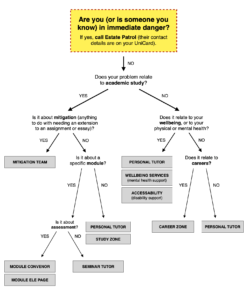Let’s begin with the understatement of the century: university is different from school. When you arrive at university, you’ve probably spent somewhere between two and six years in the same place, studying A-Levels (or equivalent) and GCSEs before that, getting to know people who can offer support and learning your way around.
Background
As such, when you first come to the big wide world of university, it’s entirely normal to feel uncertain about where to go if you feel like you need a little extra help.
At Exeter, we spend a lot of time encouraging students to ‘get in touch if they need support’, but we recognise that this isn’t necessarily as easy as it sounds. ‘Support’ can take many forms, from academic (how to read for study) to personal (feeling isolated), and from the autism-specific (how do I disclose a diagnosis?) to the general. With this in mind, this blog post will aim to demystify some of the different sources of support that are available at Exeter, and will give a sense of who it might be most appropriate to contact in a given situation.
How could this affect me?
So … how best to explain the sometimes-mystifying variety of people that you can talk to? Well — to indulge in all the autism clichés — one option is to use a flowchart. I’ve put together the diagram below (which is fairly specific to Exeter) to offer you one way of working out who to contact. Information about each source of support is linked below; additional sources of support not featured in the flowchart are marked with an asterisk.
Click on the flowchart to enlarge the image.
Practical tips
Here are some of the main contacts if you are in need of information:
- Career Zone: a dedicated team offering (as their name suggests) support regarding your career after university.
- Estate Patrol: campus security. The team are also the people to contact if you’ve locked yourself out of your room…
- Mitigation: all requests for ‘mitigation’ (that is, extensions to assignments) are handled centrally at Exeter, in order to ensure fairness.
- Module Convenor: a named staff member responsible for the overall running of a module. They may or may not also be your seminar tutor.
- Module ELE Page: every module taught at Exeter has a page on ELE, the ‘Exeter Learning Environment’. This is an online resource that allows you to access readings, and to interact with the module outside of seminars. Most module convenors provide a lot of information on their modules’ ELE pages, so it may well be the place to look for answers to your questions.
- Personal Tutor: a member of academic staff from your department who serves as a first point of contact for any concerns you may have regarding academic study. You’ll likely meet with them around twice a term (although this varies between departments), and they will have ‘office hours’ weekly, during which you can have a confidential chat.
- Residence Life Team*: a part of Wellbeing, Residence Life are a useful port of call for issues regarding accommodation, particularly first-year accommodation.
- Seminar Tutor: a member of staff responsible for running seminars, and (sometimes) marking your essays and submissions. On small modules, there’s a good chance that this will also be the module convenor; on larger modules, or modules that are ‘team-taught’, this may not be the case.
- Study Zone: online and in-person help for time management, IT skills, and more.
- Wellbeing Services: mental health support (working closely with AccessAbility, particularly regarding disability support). They offer appointments, phone consultations, and (as you may well know) dedicated support for autistic students.


 Back
Back 
